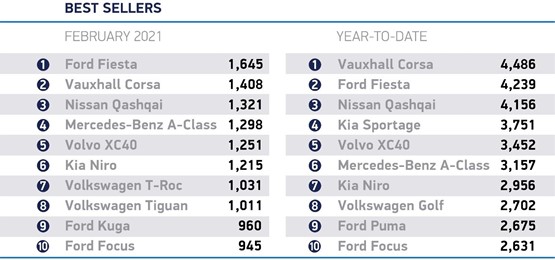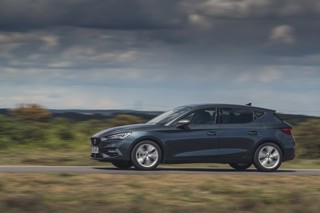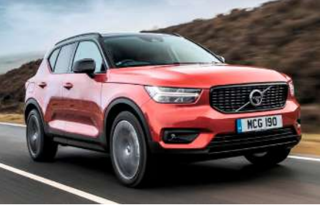Fleet and business new car registrations were down by more than a third in February as lockdown continues to depress demand, figures from the Society of Motor Manufacturers and Traders (SMMT) suggest.
There were 29,948 new cars registered to fleet and business in February, 34% fewer vehicles than in February 2020 (45,545 units).
Year-to-date, the sector is now 38% down, with 82,242 cars registered in the first two months of 2021, compared to 133,139 units during the same period last year.
Overall, the UK new car market declined by 36% in February as 28,282 fewer units were registered during a traditionally weak month for new vehicle uptake. However, it was the lowest February uptake since 1959, with just 51,312 new cars registered.
The SMMT has now downgraded its market outlook to 1.83 million registrations in 2021 as showroom closures continue to stall order books.
Mike Hawes, SMMT chief executive, said: “February is traditionally a small month for car registrations and with showrooms closed for the duration, the decline is deeply disappointing but expected.
“More concerning, however, is that these closures have stifled dealers’ preparations for March with the expectation that this will now be a third, successive dismal ‘new plate month’.
“Although we have a pathway out of restrictions with rapid vaccine rollout, and proven experience in operating click and collect, it is essential that showrooms reopen as soon as possible so the industry can start to build back better, and recover the £23 billion loss from the past year.”
All vehicle segments saw declines save for luxury saloons, which recorded a 4% increase against a statistically very small proportion of the market.
Plug-in vehicles continued to enjoy growth, with BEVs and PHEVs taking a combined 13% market share for the month, up from just 6% in February 2020.
BEV uptake increased by 40% to 3,516, and PHEVs by 52% to 3,131 as the industry continues to promote a broad range of lower-emission technologies.
However, the SMMT says that increasing uptake of these new technologies to the levels required by 2030 remains a mammoth task, with yesterday’s Budget proving a missed opportunity given the lack of measures to support the market overall and notably the transition away from pure petrol and diesel cars and vans.
With the country facing ongoing restrictions until at least 12 April, the automotive industry expects a challenging March, traditionally the sector’s most important month which would typically account for one in five annual registrations.
While online orders and click and collect can provide a lifeline, showroom closures mean dealerships will find it significantly more challenging to fill order banks following £23bn worth of fewer registrations since March 2020.
Jon Lawes, managing director of Hitachi Capital Vehicle Solutions, believes that with lockdown being gradually lifted, the automotive industry can start to look forward to a “strong recovery” in the second quarter of 2021.
However, he said: “The decision to keep showrooms and dealerships closed until at least the 12th April will mean businesses will miss out on the first new number plate issue of the year – a traditionally busy period for the sector.
“Dealerships and manufacturers must continue to look ahead: we expect to see a spike in demand as consumers regain financial and social confidence as we journey down the road to recovery.”
He continued: “Despite the challenges faced by the industry, it’s great to see that electric vehicle registration continues to rise and is up almost 50% year-on-year.
“The recent pledges from Ford and Jaguar Land Rover to go all electric in the coming years is a further positive step towards mass EV adoption. As the 2030 ICE ban approaches, we need ongoing support from manufacturers to encourage developments in charging infrastructure and support consumers and businesses in making the switch to green vehicles.”
Ashley Barnett, head of consultancy at Lex Autolease, believes that the continued growth in EVs is some comfort and with no changes to the company car tax tables in yesterday’s Budget announcement, fleet decision-makers will be encouraged to continuing planning for another vehicle replacement cycle knowing that ULEVs remain an attractive offering for company car users.
“Further fiscal incentives and on-road perks will help to drive uptake and send a clear message to OEMs that the UK is open for EV business,” he said. “They also remain crucial in stimulating demand in the second-hand market, to ensure that EV adoption is a realistic prospect across the whole affordability spectrum.
“In less than three years, more than 100,000 vehicles that were delivered in 2020 are likely to enter the used EV-market and we must work together to support and encourage wider EV uptake.”


























Login to comment
Comments
No comments have been made yet.